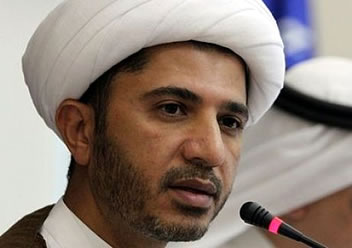As Bahrain’s parliamentary elections approach amid escalating political repression, Americans for Democracy & Human Rights in Bahrain (ADHRB) will be closely monitoring all updates until the vote on 24 November 2018. This blog series, Election Tracker, will follow developments and provide context on the upcoming elections.
See the first post on the High Committee for Elections and electoral irregularities here.
Sheikh Ali Salman, a prominent Bahraini opposition leader, continues to face judicial harassment as the elections approach on 24 November 2018. The Public Prosecution is currently appealing the imprisoned politician’s earlier acquittal on spurious charges and the court today adjourned the trial for a second time until 15 October 2018 – bringing it closer to the elections and underscoring the political basis of the allegations.
In November 2017, Sheikh Salman – Secretary-General of the now dissolved Al-Wefaq National Islamic Society, Bahrain’s largest opposition group – and two other exiled Al-Wefaq members were charged with “espionage” for allegedly “conspiring with Qatar” during the peaceful protest movement in 2011. The arbitrary charges stem from an open and documented mediation attempt between the opposition, the government, and Qatar that was conducted with the knowledge of Bahrain’s leadership and encouraged by the United States. Sheikh Salman was acquitted of these charges by Bahrain’s High Criminal Court in June 2018, but the Public Prosecution Office announced it would immediately appeal the verdict. The appeals trial was first scheduled for 5 September 2018, but has since been pushed back to 26 September, and now 15 October. The Public Prosecution has indicated that it is seeking the “maximum penalty” – death.
Sheikh Salman is currently imprisoned on charges of “inciting disobedience and hatred in the kingdom” for giving peaceful political speeches in his capacity as Al-Wefaq’s Secretary-General, but his four-year sentence is coming to an end this December. If the courts end up overturning his acquittal on the espionage charges, Sheikh Salman could face more prison time or even the death sentence.
The continued harassment of Sheikh Salman is just one part of the Bahraini government’s campaign to dismantle the opposition ahead of the elections. All major opposition groups have been arbitrarily dissolved, and new legislation enacted this year bans anyone who has ever belonged to these groups from seeking or holding elected office. Moreover, individuals are also ineligible to run for office if they previously resigned a seat in parliament – as many did in protest of the government’s violent crackdown on dissent in 2011 – or if they have been convicted of a felony and/or imprisoned for over six months. These provisions prohibit tens of thousands of former opposition affiliates as well as countless former political prisoners from gaining a seat in the lower house of parliament. Meanwhile, the authorities have virtually criminalized the expression of opposition views themselves, with criticism of the king, public institutions, national emblem, or even government policies like participating in the Yemen war punishable with years in prison.
Under royal order 36 of 2018, candidate nominations will open on 17 October 2018 and run until 21 October. The final lists of candidates who are eligible to run in the parliamentary and municipal elections will be displayed on 7 November 2018. ADHRB will monitor the registration process to assess how the new bans are implemented.
![]()





